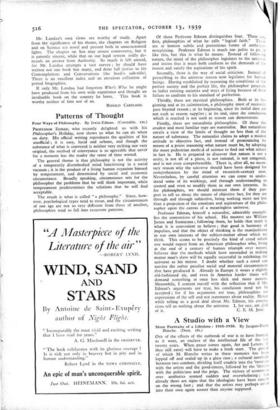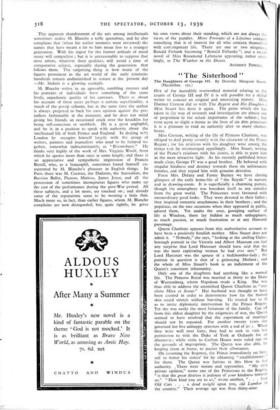A Studio with a View
More Portraits of a Lifetime : 1918-1938. By Jacques-Emile Blanche. (Dent. r8s.)
ONE of the effects of the outbreak of war is to have formed. as it were, an enclave of the intellectual life of the la,t twenty years. When peace comes again, Art and Letters it they still exist) will have to make a fresh start. The period of which M. Blanche writes in these memoirs has been lopped off and sealed up in a glass case ; a cultural interlude between two combats, dividing itself crudely into the 'twenties with the artists and the good-timers, followed by the 'thirties with the politicians and the prigs. The victory of econotr over aesthetics seemed sudden and overwhelming ; already there are signs that the ideologists have been caw. -: on the wrong foot ; and that the artists may perhaps co- into their own again sooner than anyone supposed.
This apparent abandonment of the arts among intellectuals sometimes makes M. Blanche a trifle querulous, and he also complains that (when his earlier memoirs were reviewed) the names that have meant a lot to him mean less to a younger generation. With his regret for the former attitude of mind many will sympathise ; but it is unreasonable to suppose that most artists, whatever their qualities, will avoid a time of comparative eclipse, especially during the generation that follows them. The surprising thing is how many of the figures prominent in the art world of the early nineteen- hundreds remain undiminished in stature at the present day —Mr. Sicken is a glowing example.
M. Blanche writes in an agreeable, rambling manner and his portraits of individuals have something of the same lively, unpedantic quality of his canvases. There is about his account of these years perhaps a certain superficiality, a touch of the gossip column, but at the same time the author is always prepared to back his own opinion against the pre- judices fashionable at the moment; and he does not mind giving his friends an occasional crack over the knuckles for being self-conscious or snobbish. He is a great anglophil, and he is in a position to speak with authority about the intellectual life of both France and England. In dealing with London he occupies himself largely with the group of writers, painters and journalists who used to be lumped to- gether, somewhat indiscriminately, as " Bloomsbury." He thinks very highly of the work of Mrs. Virginia Woolf, from which he quotes more than once at some length; and there is an appreciative and sympathetic impression of Francis Birrell, who, as a francophil, sometimes found himself ex- asperated by M. Blanche's pleasure in English things. In Paris there was M. Cocteau, the Dadaists, the Surrealists, the Russian Ballet, Picasso, Matisse, James Joyce, and all the procession of sometimes incongruous figures who make up the cast of the performance during the post-War period. All these subjects, and a lot more, are touched on ; and already some of the reputations seem to be wearing a little thin. Much more so, in fact, than earlier figures, whom M. Blanche complains are now disregarded; but, quite rightly, he gives
his own views about their standing, which are not always the views of the pundits. More Portraits of a Lifetime contains something that is of interest for all who concern themseh with contemporary life. There are one or two misprint-, Ronald Firbank becoming " Ronald Firbanks "; and a recent novel of Miss Rosamond Lehmann appearing, rather start- lingly, as The Weather in the Sheets. ANTHONY POWELL.











































 Previous page
Previous page